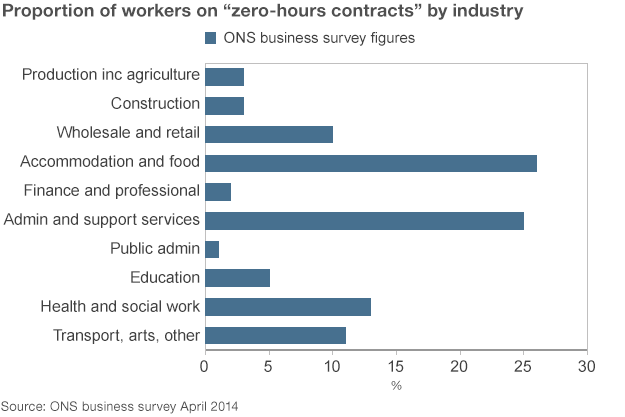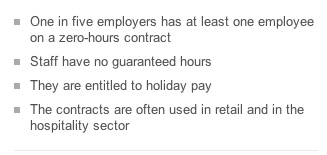Zero-hours contracts, get a fixed price review from The Legal Partners
We have created a Fixed Price Review of your zero-hours contracts to help businesses be prepared for these changes, minimise the administrative workload that comes with them and avoid the PR, discrimination and legal risks that threaten to arise.
Our £950+vat fixed price review will assess the current zero-hours contracts your business uses and ensure you and your teams are prepared and covered for the news laws, in whatever form they take, when they arrive .
What are zero-hours contracts?
A zero-hours contract is one used for casual working. The employer does not guarantee to provide the casual worker with any work and pays the worker only for work actually carried out. The worker is expected to be available for work when or if called on by the employer.
For more detail, this article is an employers guide to zero-contract hours. https://www.thelegalpartners.com/zero-hours-contracts-guide-employers/
What industries most use zero-hours contracts?
From companies Sports Direct, JD Wetherspoons to Councils and Universities; in fact 50% of all big companies in the UK use 1.4million zero-hours contracts, according to a recent survey from the ONS. Usage of zero-hours contracts varies dramatically across sectors. The same study found that 20% of health and social workers are on these contracts, but that they were rare amongst workers in the financial sector. Here is a breakdown by Industry sector:

Ban on Exclusivity in zero-hours contracts.
The Government, Opposition and Trade Unions have all proposed changes to the zero-hours contracts. The Government has already consulted with employer and employee trade bodies and unions.
Given the support of an overwhelming majority of respondents (83%), the Government has decided to ban exclusivity clauses in contracts which do not guarantee hours of work. The government expects the ban to benefit 125,000 zero hours contract workers estimated to be tied to an exclusivity clause.
What does “Exclusivity” in Zero-Hours contracts mean?
An exclusivity clause in a zero hours contract means that the employer can prevent the individual from working for someone else, even though the employer does not guarantee a number of hours of work. Currently employers can require an employee to work for them exclusively on this basis.
When will “Exclusivity” clauses in Zero-Hours contracts be banned?
The ban under new employment law is likely to come into force later this year, but it’s unlikely to be before 6 November 2014.
What should the busy HR Director do?
- Review current zero-hour contracts and analyse how many workers are affected and what are the rights and obligations in those contracts. Please note – the review may show that zero-hours contracts are no longer suitable or a more standard employment contract with minimum fixed hours may be better.
- Write to all affected employees outlining the proposed changes to their contract.
- Send the amended contract
- Ask them to sign and date the amended contract and return it to HR Department.
- Ensure the signed contract is added to the relevant employee’s HR file.
- Agree extra administration budget for these changes. We can help you budget for and implement these changes cost effectively.
This could also be a good opportunity to review the current zero-hours contract for:
- any other operational changes required by the business
- updating the contracts for law changes e.g hourly salary increases so the contract is kept up to date
- changing the zero-hours contract to a more standard employment contract with minimum fixed hours.
Making the changes can also show the zero-hours workers that the employer is looking to engage with them by changing their contracts pro-actively as the law in this area changes.
Be careful when changing zero-hours contracts without a full review of the worker’s legal status.
This is because if the worker is in fact an employee, he/she will have the right to a minimum amount of notice before the contract can be changed eg 4 weeks notice after 4 years + of service.
He/she will also have unfair dismissal protection after 2 + years of service and the right to a statutory redundancy payment, proper consultation and alternative employment if he/she has been employed for 2+ years.
As always workers and employees may bring discrimination claims if they feel there are grounds to slow down any contract change process.
What are the risks if an employer does not make the change?
At the least it will be embarrassing for a business to have overlooked such a well publicised law change. Employee’s know their rights and will bring grievances and, if they are unresolved, claims at Employment Tribunals wasting management time and incurring legal costs for the employer.
These risks can quickly become PR and reputation problems if an employee, or many employees then publicise on social media that their employer is not complying with employment law , or the union become involved.
Be prepared for further changes in the zero-hours contract law
What are the new law changes?
The Government has announced plans to develop sector-specific codes of practice on the fair use of zero-hours contracts. This is expected to include guidance on recommended best practice for providing and cancelling work and how to calculate accrued workers benefits under zero-hours contracts.
What are the proposed codes of practice for zero-hours contracts?
The Government has also announced that business representatives and unions should work together to develop sector-specific codes of practice to help guide the fair use of zero-hours contracts. However, it is not clear how and when these codes of practices will be developed.
The codes are expected to cover:
When zero-hours contracts should be used and how to identify them to job applicants and workers.
Rights and responsibilities of the individual and the employer. This will include how to calculate accrued benefits such as annual leave.
Allocating work and notice of hours of work or cancellation of work.
ACAS https://www.acas.org.uk/zerohours has stated that it is keen to engage with the government on how best to provide additional support in this area.
This is a hot topic for UK businesses and will continue to be so into next year.
If you are using or are considering using Zero-Hours contracts going-forward, contact me at Richard.Mullett@thelegalpartners.com to ensure that your company is fully protected from the legal, discrimination and PR risks involved.
Our £950 +VAT fixed price review will make a big difference to minimising your company’s legal and PR risks.







